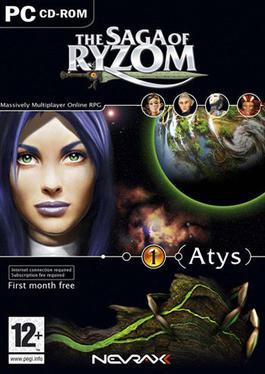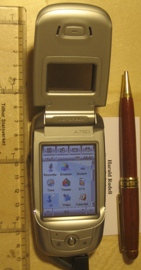
Freeciv is a single- and multiplayer turn-based strategy game for workstations and personal computers inspired by the proprietary Sid Meier's Civilization series. It is available for most desktop computer operating systems and available in an online browser version. Released under the GNU GPL-2.0-or-later, Freeciv is free and open-source software. The game's default settings are closest to Civilization II, in both gameplay and graphics, including the units and the isometric grid. However, with a lot of multiplayer games being played in longturn communities, rulesets and additional variants have evolved away from the original ruleset. Freeciv is playable online at Longturn.net, Freecivx.net, freecivweb.org and some temporary private servers.

The WorldForge project is producing an open source framework for massively multiplayer online role-playing games. The intent lies in creating a widely used development framework and set of libraries by motivating interested developers to improve on the original source code.
The File Transfer Protocol (FTP) is a standard communication protocol used for the transfer of computer files from a server to a client on a computer network. FTP is built on a client–server model architecture using separate control and data connections between the client and the server. FTP users may authenticate themselves with a plain-text sign-in protocol, normally in the form of a username and password, but can connect anonymously if the server is configured to allow it. For secure transmission that protects the username and password, and encrypts the content, FTP is often secured with SSL/TLS (FTPS) or replaced with SSH File Transfer Protocol (SFTP).

Damn Small Linux (DSL) is a computer operating system for the x86 family of personal computers. It is free and open-source software under the terms of the GNU GPL and other free and open-source licenses. It was designed to run graphical user interface applications on older PC hardware, for example, machines with 486 and early Pentium microprocessors and very little random-access memory (RAM). DSL is a live CD with a size of 50 megabytes (MB). What originally began as an experiment to see how much software could fit in 50 MB eventually became a full Linux distribution. It can be installed on storage media with small capacities, like bootable business cards, USB flash drives, various memory cards, and Zip drives.

Wolfenstein: Enemy Territory is a free and open-source multiplayer first-person shooter video game within the Wolfenstein series. It was originally planned to be released as a commercial expansion pack to Return to Castle Wolfenstein and later as a standalone game. However, due to problems with the single-player aspect, the multiplayer portion was released on 29 May 2003 as a freeware standalone game. In January 2004, the source code for the game logic was released to the benefit of its modding community.

BZFlag is an online multiplayer free and open-source tank game. In the game of BZFlag, players drive around tanks, viewed from a first-person view, in a server-defined world, which can be modified.

Ryzom, also known as The Saga of Ryzom, is a free and open source massively multiplayer online role-playing game (MMORPG) developed by Nevrax for Microsoft Windows, OS X, and Linux.

FileZilla is a free and open-source, cross-platform FTP application, consisting of FileZilla Client and FileZilla Server. Clients are available for Windows, Linux, and macOS. Both server and client support FTP and FTPS, while the client can in addition connect to SFTP servers. FileZilla's source code is hosted on SourceForge.

id Tech 3, popularly known as the Quake III Arena engine, is a game engine developed by id Software for its 1999 game Quake III Arena. It has subsequently been used in numerous games. Commercially, id Tech 3 competed with early versions of the Unreal Engine; both were widely licensed. Originally proprietary, it is now open-source software.

Alien Arena is an open-source, stand-alone first-person shooter video game. Begun by COR Entertainment in 2004, the game combines a 1950s-era sci-fi atmosphere with gameplay similar to the Quake, Doom, and Unreal Tournament series. Alien Arena focuses mainly on online multiplayer action, although it does contain single-player matches against bots.

The Spring Engine is a game engine for real-time strategy (RTS) video games. The game engine is free and open-source software, subject to the terms of the GNU General Public License v2.0 or later.

The Motorola A780 is the second cellular PDA running the Linux operating system.

Tremulous is a free and open source asymmetric team-based first-person shooter with real-time strategy elements. Being a cross-platform development project the game is available for Windows, Linux, and Mac OS X.

Dungeon Crawl Stone Soup (DCSS) is a free and open source roguelike computer game and the community-developed successor to the 1997 roguelike game Linley's Dungeon Crawl, originally programmed by Linley Henzell. It has been identified as one of the "major roguelikes" by John Harris.
Egoboo is a free-to-play 3D open source dungeon crawling action role-playing game with support for Windows XP, Windows Vista, Linux, Mac OS X, and some earlier versions of Windows. Egoboo has been downloaded over 590,000 times since its first release over SourceForge alone until mid 2016, while Egoboo can be downloaded from other sources as well.

PlaneShift is a free to play, cross-platform 3D Online Multiplayer Role Playing Game in a fantasy setting. The game requires client software to be installed on the player's computer. The project is no-budget and produced by a group of developers guided by the Atomic Blue organization. The development team comprises volunteers from mostly European countries and North America.

Endian Firewall is an open-source router, firewall and gateway security Linux distribution developed by the South Tyrolean company Endian. The product is available as either free software, commercial software with guaranteed support services, or as a hardware appliance.
A Minecraft mod is a mod that changes aspects of the sandbox game Minecraft. Minecraft mods can add additional content to the game, make tweaks to specific features, and optimize performance. Thousands of mods for the game have been created, with some mods even generating an income for their authors. While Mojang Studios does not provide an API for modding, community tools exist to help developers create and distribute mods. The popularity of Minecraft mods has been credited for helping Minecraft become one of the best-selling video games of all time.















